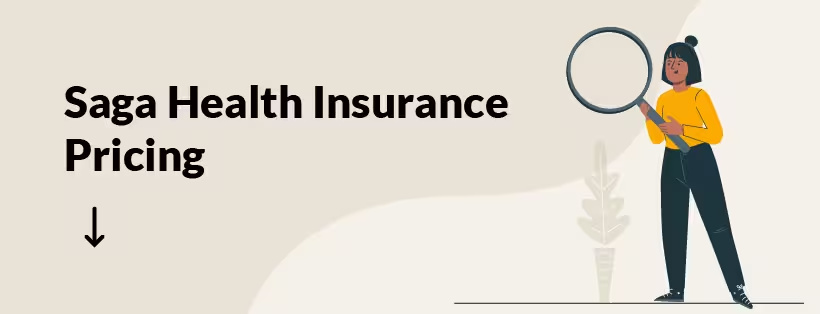Saga Health Insurance, our 2026 expert review
Saga specialises in offering products and services for the over 50s, including health insurance. Read our expert Saga health insurance review to uncover what sets it apart from other health insurers and discover whether it could be an option for you.


Is Saga the best over 50s health insurer in the UK?
In our 2026 private medical insurance ratings, Saga’s HealthPlan Secure and HealthPlan Super private medical insurance plans scored 74.5%, earning them a four-star myTribe rating.
Saga health insurance offers plenty of benefits within its core policy, including mental health cover, but its biggest draw is its shorter three-year moratorium. But you’ll only be able to get Saga health insurance if you’re over 50, it won’t be an option if you are younger.
Here’s a summary of the key points of our Saga Health Insurance Review:
- Saga has four versions of its HealthPlan health insurance (Support, Saver Plus, Secure and Super), each offering different levels of outpatient cover and additional benefits.
- Saga’s most comprehensive health insurance policy is its Super plan.
- A standout feature is Saga’s three-year moratorium, which could mean fewer exclusions.
- Unusually, Saga allows you to potentially cover pre-existing hypertension if you can satisfy its underwriting criteria.
- Its Saver Plus, Secure, and Super health insurance includes direct access to MSK services and mental health care and support as standard.
See how Saga compares: Our 2026 ratings of the UK’s best private health insurance providers
About Saga
Saga was founded in 1951, originally offering package holidays for retirees. Over the decades, it has expanded beyond travel, specialising in a range of products and services aimed at people over 50, including health insurance. Saga has around 2.7 million customers across its travel, insurance and financial services, and is recognised as a leading UK brand for the over-50 demographic.
Saga offers four health insurance plans for individuals and families, each tailored to suit different budgets, cover levels and healthcare needs. Every Saga plan includes full cover for inpatient and day patient treatment and outpatient surgical procedures as standard. The key difference between them is the amount of outpatient cover provided for specialist consultations, diagnostic tests and follow-up care.
In addition, Saga offers the following to members:
- Saga GP Service (24/7) - included on all plans.
- Anytime Healthline - included on all plans.
- Direct Access (musculoskeletal & mental health) - Super, Secure and Saver Plus only.
- Cancer Care Team support - included on all plans.
- Second Opinion service - Super, Secure and Saver Plus only.
How our experts see each of Saga’s plans
Comparing Saga’s plans with one another is a tad tricky, and that’s before you try to compare them with what other providers offer! In this section, we outline the key differences our team of health insurance experts think you need to be aware of.
1. Saga HealthPlan Support
To help keep the cost down, Saga HealthPlan Support focuses purely on inpatient and day patient treatment (including specialist fees and diagnostic tests), outpatient surgical procedures, plus 24/7 access to the Saga GP Service.
Crucially, as a budget option it doesn’t include outpatient consultations or diagnosis, and only covers the surgical treatment of cancer, so other treatments, for example, chemotherapy will need to be provided by the NHS. This plan can only be arranged by calling Saga.
2. Saga HealthPlan Saver Plus
Saga HealthPlan Saver Plus is a step up from the Support plan, but is another more affordable private medical insurance plan. It does include some outpatient treatment, but this is a rather conservative £1,000 annual limit which is shared across consultations, diagnostic tests, practitioner, physiotherapy, acupuncturist and therapist fees. You are also limited to one CT, MRI or PET scan each year. However, you can receive unlimited scans within eight months of eligible inpatient, day patient treatment or outpatient surgery.
Saver Plus gives you access to the Saga GP service and Second Opinion Service and covers cancer treatment, including radiotherapy and chemotherapy. For mental health conditions, the plan includes up to 28 days of inpatient or day patient treatment, along with up to £1,500 for outpatient specialist mental health consultations and diagnostic tests.
3. Saga HealthPlan Secure
Saga’s HealthPlan Secure offers more extensive benefits than Support and Saver Plus. You’ll get unlimited scans and an outpatient benefit up to £2,000 (again shared across multiple types of treatment), as well as up to £400 post-operative outpatient physiotherapist, therapist and acupuncturist treatment. There are also higher limits for outpatient mental health cover, a longer nursing at home period, as well as some recuperative care cover.
4. Saga HealthPlan Super
Saga Health Plan Super is Saga’s most comprehensive health insurance product aimed at those who want peace of mind of having the broadest range of cover. It generally shares the same core cover as Saga HealthPlan Secure but includes a few additional features and offers higher, or unlimited, benefits. Crucially, it offers unlimited cover for outpatient treatment and some additional benefits such as a cash payment for major dental work. We’ll discuss the cover that it provides in more detail in the next few sections.
You can tailor your Saga Health insurance by adding extra benefits for an additional cost. However, some cover options will only be available based on the medical information that you provide when you apply.
Does Saga health insurance cover pre-existing conditions?
Whether Saga can cover any pre-existing conditions depends on your underwriting method and how long it's been since you had symptoms or treatment.
Under Saga’s moratorium underwriting, medical conditions you've had or experienced symptoms of in the three years before your policy starts are generally excluded. However, like other insurers, Saga may cover them later if you go two consecutive years without any treatment, medication, advice, or symptoms for that condition.
If you choose full medical underwriting, Saga will review your full medical history when you apply. They can then tell you upfront whether any pre-existing issues are covered.
One notable exception is pre-existing hypertension. Saga may cover it if:
- you’ve had no history of diabetes, heart disease, or stroke and
- your blood pressure has been controlled by your GP for at least two years.
Even then, you’ll need to select it as an additional option when you apply.
What’s not covered by Saga health insurance?
Like other health insurers, Saga health insurance has some general exclusions for certain types of treatment that you won’t be covered for. These include:
You may also have personal exclusions based on your medical history and any pre-existing medical conditions. The Saga HealthPlan Super Policy book details what types of treatment and conditions aren’t insured.

The cost of a Saga health insurance policy varies on an individual basis, according to your age, where you live, the plan you choose and how you tailor your cover.
Adding extra benefits such as extended cancer cover, health cash benefits, pre-existing hypertension cover or no claim discount protection, will increase your premium, as will opting for a hospital list rather than guided care.
To give you a rough idea of the cost, here are some example Saga health insurance quotes for someone living in the East of England, choosing standard cover with a £250 excess.
How to reduce your Saga health insurance premium?
If you're looking to lower your premium or keep costs down, Saga provides a couple of ways to adjust the price - beyond simply choosing the guided care option:
Add a 4-week or 6-week wait
Some health insurers offer a six-week wait option, but Saga uniquely also gives the choice of a shorter four-week wait. If the NHS can provide the treatment locally within four weeks, you’ll be treated by the NHS and get £100 per night in hospital (up to £2,000 each year). If not, you’ll be treated privately under your plan.
Adding a 4-week waiting period can cut your premium by around 15% (based on a 55-year-old in the East of England with a Saga HealthPlan Super). If you opt for a 4-week wait just make sure you’re happy to use the NHS if treatment is available within that timeframe. For certain conditions like varicose veins surgery or gallbladder removal, you’ll still get private treatment straight away, even with the wait option.
Saga also offers a six-week wait option, but you’ll need to call them to arrange it as it’s not available online.
Select your policy excess
You can also lower your premium by choosing a higher excess, with Saga offering excess levels of £0, £100, £250, £500, £750 or £1,000.
When choosing the right health insurance, don't just look at what a policy offers in isolation. Compare how it measures up to other private health insurance providers so that you can decide whether another option may be more suitable. To help you compare Saga’s health insurance, our team of experts has uncovered six important differences to be aware of:

Saga’s medical underwriting options
Saga offers different choices of underwriting based on whether you are new to health insurance or want to switch from another provider.
Underwriting if you don’t have health insurance
If you don’t have an existing health insurance policy, you can choose from two underwriting options with Saga:
Moratorium underwriting
If you opt for moratorium underwriting you won’t have to complete a full medical declaration. However, Saga will ask a few medical screening questions as part of its process to determine whether some cover options, like extended cancer cover, can be offered.
With moratorium underwriting, any condition for which you’ve had symptoms, treatment, medication, or advice in the past three years will initially be excluded from your policy. However, if you go two consecutive years “trouble free” , it may be covered again in the future.
Full medical underwriting
With full medical underwriting you’ll need to complete a detailed medical questionnaire when you apply. Saga may also ask your GP for any further information if it is required.
By assessing your health history, Saga can confirm in writing which conditions are covered or excluded, giving you a clear idea of your cover from the start. In some cases, you may be able to request a review of a previously excluded condition later on, which could lead to it being added to your policy.
Underwriting if you have health insurance with another provider
The underwriting process is slightly different if you already have health insurance with another provider.
Continued personal medical exclusions
If you’re switching an existing health insurance policy, Saga may allow you to keep your cover for pre-existing conditions on a continued personal medical exclusions (CPME) basis. However, this will depend on your medical history over the previous 12 months.
If you choose CPME, you’ll pay a higher premium than with the moratorium and full medical underwriting options.
Saga’s Trustpilot reviews give an indication of how its customers rate its level of service. Saga has a rating of 4.0 out of 5 stars on Trustpilot from 42,696 reviews (2nd February 2026), which is deemed “great”. However, its Trustpilot score is lower than most of the other health insurers we have reviewed.
Given the company’s broad range of services and the fact that many of its health insurance reviews are “sales-based” rather than “claims-based”, it's difficult to pinpoint what Saga’s customers specifically think about its health insurance. Where health insurance has been mentioned most reviews are complimentary about Saga’s customer sales service and the ease of applying, but there is criticism of its renewal pricing and some of its claims decisions.
Example Saga health insurance reviews from its customers (sales based reviews)
“Have made the switch to Saga Health Insurance as the policy is superior to my current provider of nine years and costs significantly less. The excellent service made the switch easy and was another factor in my decision.”
“Just taken out health insurance with Saga, the price was very reasonable. The lady on the phone was very helpful and explained everything to me.”
“The agent spent a long time explaining everything I needed to know regarding the product I wished to buy, making sure I fully understood every aspect of health care that suited myself and my partner's needs.”
How to get more information about Saga health insurance
Saga’s website is a great starting point if you want to learn more about its health insurance, including downloading its policy guides.
To see how Saga’s health insurance stacks up against other health insurers you can read our expert review of the Best private health insurance in 2026.
As well as doing your own research, it’s wise to speak with a broker who can help you compare your options before you buy a policy. For a free comparison quote and personalised guidance from one of our expert health insurance brokers, please complete our form.
What our readers say
We are rated Excellent on Google from 150+ reviews. Our reviews relate to the service provided by both myTribe and its partners.
Disclaimer: This information is general, and what is best for you will depend on your personal circumstances. Please speak with a financial adviser or do your own research before making a decision. The brokers we work with provide a comparison service from a panel of some of the UK’s top health insurers. Not every broker works with all the insurers listed in our guides.
Frequently Asked Questions
How good is Saga health insurance?
Saga’s health insurance was rated four stars in the 2026 myTribe Private Medical Insurance ratings and also has a Trustpilot score of four out of five based on customer reviews. Its flagship HealthPlan Super and Secure products offer a comprehensive level of core cover and the ability to add other options, making it a solid choice for some older adults.
How much does Saga health insurance cost per month?
The cost of Saga health insurance will vary, depending on your age, where you live and your cover levels. Prices increase with additional benefits like extended cancer cover, health cash benefits or if you opt for a lower excess. To reduce costs, Saga offers options like guided care and a 4-week wait, which can make your cover more affordable.
Is Saga part of Bupa?
Saga is not part of Bupa. Both companies are separate entities with distinct ownership and business models. However, Bupa does underwrite Saga’s health insurance policies.
How does Saga health insurance compare with Bupa?
Saga health insurance is designed specifically for people aged 50 and over, while Bupa serves customers of all age groups. Bupa topped the 2026 myTribe private medical insurance ratings, standing out for its mental health cover and fair no claims discount. Saga’s main advantage is its shorter moratorium period (three years compared to Bupa’s five years).
Does Saga health insurance cover dental?
Saga doesn’t automatically include dental cover in its health insurance. However, it can be added as an extra benefit to Saga HealthPlan Super as part of a package of health cash benefits for an additional cost. Adding this option gives each person named on the policy £200 cover each year for three separate types of dental treatment: dental care, dental accident and dental emergency.












